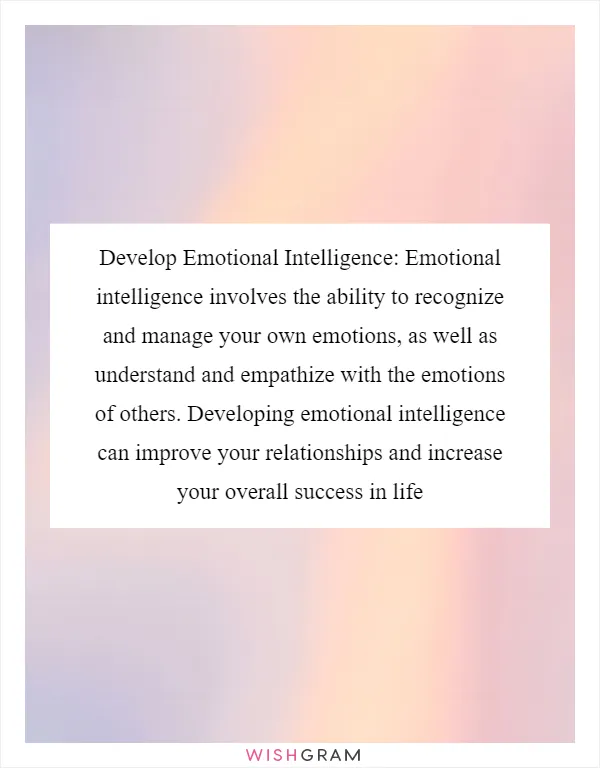Develop Emotional Intelligence: Emotional intelligence involves the ability to recognize and manage your own emotions, as well as understand and empathize with the emotions of others. Developing emotional intelligence can improve your relationships and increase your overall success in life
Emotional intelligence is a valuable skill that can greatly benefit your personal and professional life. It encompasses the ability to identify and control your own emotions, while also understanding and empathizing with the emotions of others. By developing emotional intelligence, you can enhance your relationships and increase your overall success.
Recognizing and managing your own emotions is a crucial aspect of emotional intelligence. It involves being aware of how you feel and understanding the impact your emotions can have on your thoughts and actions. By being in tune with your emotions, you can make more informed decisions and respond to situations in a more thoughtful and constructive manner.
Furthermore, understanding and empathizing with the emotions of others is equally important. This skill allows you to connect with people on a deeper level and build stronger relationships. By putting yourself in someone else's shoes and truly understanding their feelings, you can respond with empathy and support, fostering trust and mutual respect.
Developing emotional intelligence can have a positive impact on your relationships. When you are able to recognize and manage your own emotions, you are less likely to react impulsively or let negative emotions dictate your behavior. This can prevent conflicts and misunderstandings, leading to healthier and more fulfilling relationships with friends, family, and colleagues.
Additionally, by understanding and empathizing with the emotions of others, you can build stronger connections and improve your communication skills. When you genuinely listen and validate someone's feelings, they are more likely to feel understood and valued. This can create a supportive and harmonious environment, where people feel comfortable expressing themselves and working together towards common goals.
Emotional intelligence is not only beneficial in personal relationships but also in professional settings. Employers value individuals who can effectively manage their emotions and understand the emotions of others. This skill can lead to better teamwork, increased productivity, and improved leadership abilities.
To develop emotional intelligence, it is important to practice self-awareness and self-reflection. Take the time to understand your own emotions and the triggers that may cause certain reactions. By recognizing patterns in your emotional responses, you can learn to manage them more effectively.
Additionally, actively listening and being present in conversations can help you understand the emotions of others. Pay attention to non-verbal cues, such as body language and tone of voice, as they can provide valuable insights into someone's emotional state. Show empathy and validate their feelings, even if you may not fully understand or agree with them.
